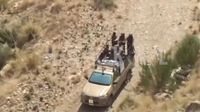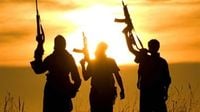In a significant escalation of violence in Pakistan’s Balochistan province, the Baloch Liberation Army (BLA) has claimed responsibility for two coordinated attacks that left 14 Pakistani Army personnel dead. The incidents occurred on May 8, 2025, underscoring the intensifying insurgency and volatile conditions in the region.
The first attack was executed by the BLA’s elite Special Tactical Operations Squad (STOS) in the Shorkand region of Bolan. Using a remote-controlled improvised explosive device (IED), the squad targeted a military convoy, resulting in a devastating explosion that killed all 12 soldiers on board. Among the deceased were Special Operations Commander Tariq Imran and Subedar Umar Farooq. The blast completely destroyed the military vehicle, signaling a high level of planning and execution by the insurgents.
Following the initial strike, a second attack occurred in the Kulag Tigran area of Kech district. BLA fighters detonated another remote-controlled IED against a Pakistan Army Bomb Disposal Squad conducting a clearance operation around 2:40 PM, killing two additional soldiers. BLA spokesperson Jiand Baloch claimed responsibility for both attacks, asserting that the Pakistani Army operates as a mercenary force protecting foreign interests, particularly those of China.
In his statement, Baloch warned that attacks against this "occupying mercenary force" would intensify. He characterized the Pakistani military as a "mercenary armed gang" thriving on external capital, stating, "The meaning of the army's uniform shifts—sometimes guarding ports, guarding corridors, serving the satisfaction of lenders." This rhetoric reflects the deep-seated resentment among Baloch nationalists, who accuse the federal government of exploiting the region’s rich natural resources while neglecting local communities.
Balochistan has been a hotbed of unrest for nearly two decades, with ethnic Baloch groups alleging systemic discrimination, economic exploitation, and political marginalization. Despite being rich in minerals and gas, the province remains one of Pakistan’s poorest, with local residents often feeling excluded from the benefits of resource extraction.
The recent attacks highlight the ongoing conflict and the challenges faced by Pakistan’s military in combating insurgency in the region. The BLA has been behind several high-profile attacks in the past, including the hijacking of the Jaffar Express passenger train in March 2025, which resulted in the deaths of 21 civilians and four soldiers. This incident, like the recent attacks, underscores the operational capabilities and reach of the BLA.
The BLA’s actions come at a time of heightened tensions in the region, particularly following India's military operations against terror infrastructure in Pakistan-occupied territory. Just a day before the BLA's attacks, India launched "Operation Sindoor," targeting camps used by militant groups for cross-border attacks. This operation was a response to a terror attack in Pahalgam that killed 26 people, further complicating the security landscape in South Asia.
In light of these developments, the Pakistani military has intensified its operations in Balochistan, conducting sanitization efforts to eliminate remaining militants. However, the effectiveness of these operations remains in question, as the BLA continues to carry out bold attacks against security forces.
The Pakistani government has accused Afghanistan of providing support to groups like the BLA, alleging that the Taliban regime shelters and funds anti-Pakistan elements. This accusation further strains relations between the two neighboring countries and complicates efforts to stabilize Balochistan.
As the conflict continues, the divide between Baloch nationalists and the federal authorities remains stark. Many locals view the military presence not as a protective force but as an occupying entity, fueling further resentment and resistance. The disconnect between the aspirations of Baloch nationalists and Islamabad’s policies is a key source of instability in the region.
The BLA's recent attacks serve as a reminder of the persistent and deep-rooted conflict in Balochistan. As separatist groups continue to demand independence, citing political marginalization and human rights abuses, the situation remains precarious. With both sides entrenched in their positions, the prospect for peace seems distant, leaving the region to grapple with ongoing violence and instability.
In conclusion, the recent BLA attacks not only highlight the immediate dangers faced by Pakistani security forces but also reflect the broader issues of governance, resource distribution, and ethnic tensions that continue to plague Balochistan. The international community watches closely as the situation evolves, aware that the implications of this conflict extend beyond Pakistan's borders.






